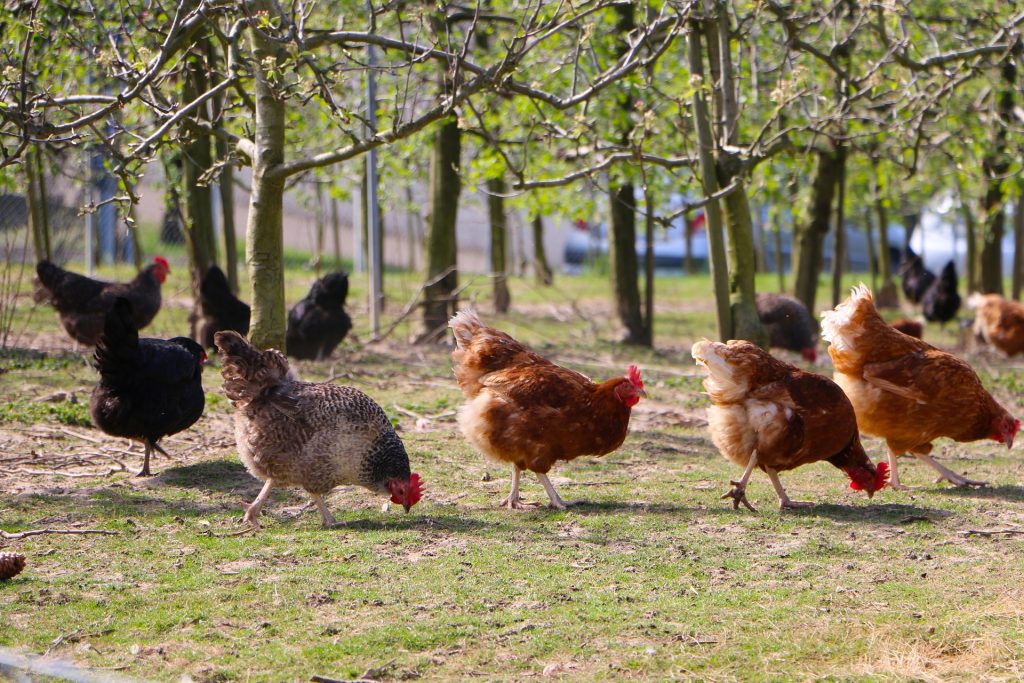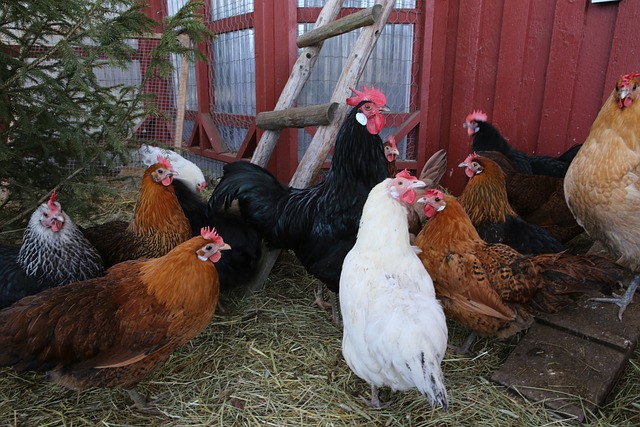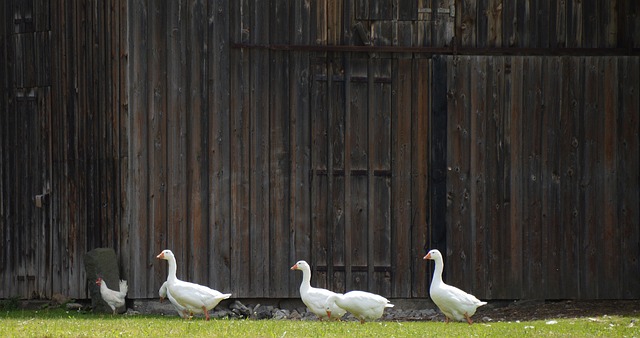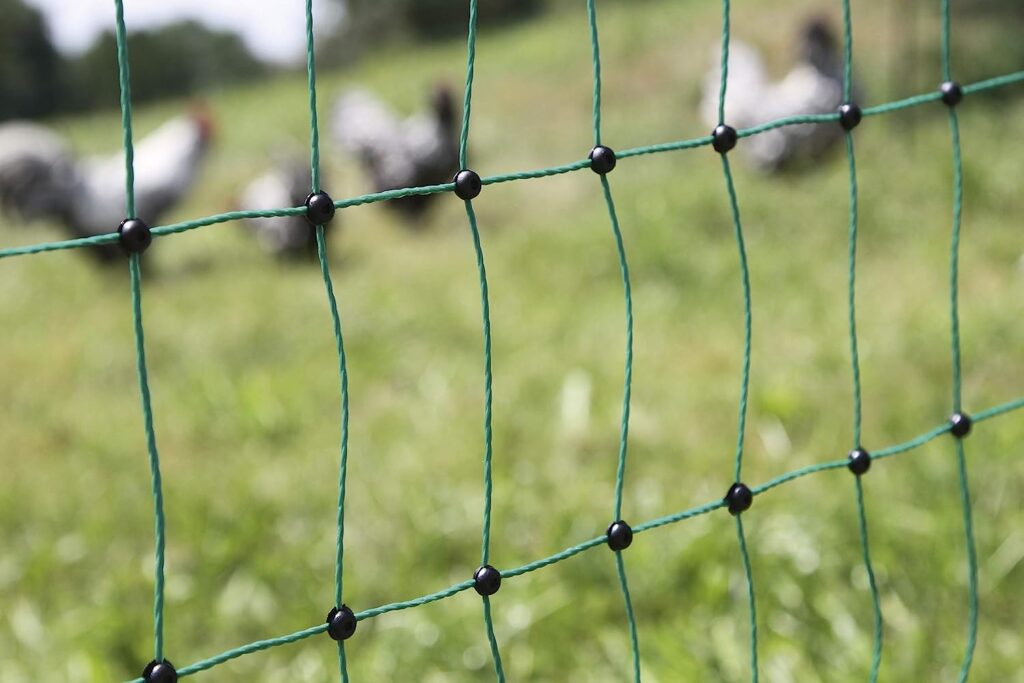Keeping chickens safe from predators on a farm, smallholding or in a back garden is vital, as any poultry will attract the interest of opportunists. Foxes, birds of prey, weasels and domestic cats and dogs can all pose a threat to your flock, so to keep them safe there are a few things you can do.

Adequate Fencing
A determined fox is able to chew through chicken wire, so thicker galvanised mesh is the best option if you don’t want an electric fence. It should be six feet high to prevent dogs and foxes from climbing over, however other predators will still be able to access your flock.
To stop foxes from tunnelling under, the fencing ought to continue below ground level for at least a foot, two feet if possible. To do this you will need to dig a narrow trench to sit the mesh in.
A roof made from netting or wire can be added to make a secure enclosure, especially if your chickens are unsupervised during the day. This will also prevent attack from birds of prey.
Electric poultry netting is very efficient at keeping predators at bay. Just one touch of electrified fencing is usually enough to stop any attempt at getting in. The benefit of poultry netting is that it is a cheaper way to secure chickens in a large area.
Secure Chicken Coop and Run
Ensure your chicken coop and run are well-built and secure. Use sturdy materials like strong wire mesh or hardware cloth to block any potential entry points for predators. Regularly check for gaps or loose spots and repair them promptly.
Prevent night time predators by making sure you lock your hens in their housing each night. Use sliding locks, not catches, to prevent curious animals from scratching a door open. Ensure all windows and vents are adequately covered with appropriate mesh or hardware cloth.
Keep up-to-date with any repair work needed for hen housing to avoid weak spots from developing. A hole that’s just an inch wide is easy for weasels to get through, or the claw of a determined fox.
Biosecurity
Make sure there’s not too many food scraps around. This will encourage rats which in turn can attracted bigger predators. Rats will also eat eggs and chicks. Keep the area clean and clear of fallen fruits or other items that may entice wildlife.

Human Scent
The smell of humans will deter wild predators. If you are having a haircut, you could leave the clippings around the coop. Old clothing left near the coop will also leave a human scent, or you could even pee nearby!
Vigilance with Pets
Pets such as cats and dogs will usually learn to live in harmony with chickens, however keep a close eye if you chickens are a new addition. It’s a good idea to remove any dense vegetation near your coop, as this allows predators to use it as cover to stalk their prey.
Use Guard Animals
Some animals are naturally protective and can provide additional security. Consider adding a trusted companion for your chickens, such as a dog or goose, to help deter predators. A guard dog will act as a warning to most predators, who will avoid any confrontation. Similarly, a dog’s bark will alert you to any nearby animals. Make sure your dog is chicken friendly!
Noisy poultry such as geese will quickly alert you to any predators lurking. Llamas and alpacas are also good guard animals and will chase off a fox. If you have the room to keep them, you could also enjoy profiting from their fleece.

Motion Sensor Lights or Sound
Install motion sensor lights around the perimeter of your chicken coop and run area. These lights can be triggered by the presence of a predator, quickly illuminating the area. Predators, especially those that prefer to hunt in the darkness, are often startled by the sudden burst of light, causing them to retreat. Make sure the lights are positioned strategically to cover all vulnerable areas.
Sound devices emit loud noises or animal distress calls that simulate danger or potential threats. The sudden sound can startle predators, making them think twice about approaching your coop. Some modern sound devices may even allow you to customise the sound or adjust the volume based on the type of predator you are trying to deter.
The Takeaway on Keeping Chickens Safe from Predators
Keeping chickens safe from predators does take work, but putting in the effort means you have peace of mind. It’s much better to spend a few hours making your coop and housing secure than losing your birds to a fox or other predator. It’s a good idea to use a few different methods to make your coops as secure as possible, and enjoy happy hens and plenty of eggs!
It’s important to stay vigilant and monitor your chickens’ surroundings regularly. Adapt your predator prevention strategies based on the specific threats in your area. If you notice any signs of predators or unusual activity, take immediate action to address it and protect your chickens.
Do you have any tips on keeping chickens safe from predators? Share them in the comments!


It is helpful to prevent predators with savvy climbing skills from entering through the roof of your coop. Lining your coop, or even fencing with metal siding will prevent these agile critters from getting a grip on your fencing, and climbing to the top and over or thorough to your sleeping hens. You’d be surprised at how easy it is for small predators, like snakes, to slither into coops and eat your eggs, and even your chickens in some cases. Closing off all access holes, while allowing for proper ventilation, can be a challenge for chicken owners.
Good point. A slippery side means claws are not able to grip easily. Thanks for your comment.